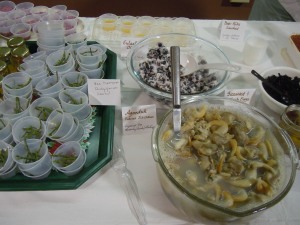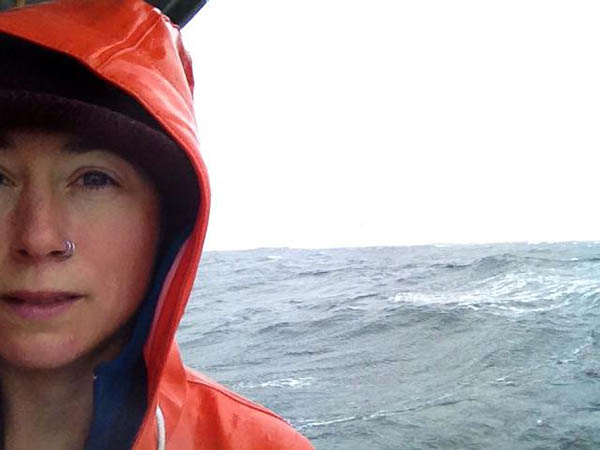Year-round, Sitka’s bulletin boards are thick with flyers of talks, classes, performances. My Hokey-Pokey presence – one foot in the community, one foot out – has often meant that if it sounds like something I’d like to experience, it’ll happen while we’re out fishing. The timing of this sign was a welcome exception:
Built in 1914, the Alaska Native Brotherhood Hall is a green shingled hulk of a building. It squats on the creosote-coated shoulders of tired pilings, between street and shore, and hosts the farmer’s market, community meetings, fundraisers, and memorials. Locals refer to it with a gently slurred “Ayne bee,” letters exiting larynx with the soft spring of walking on muskeg.
I entered ANB with déjà vu. A lifetime earlier, I ran a dinner program for homeless youth. Teen Feed was hosted by generous neighborhood churches, basements that followed exactly this layout: industrial kitchen, heavily-laden buffets with volunteer servers at the ready, carefully spaced folding tables for guests. But instead of asking us to sign in and check any weapons, the bird-like woman at the door opened her cash box.
“It’s $12 for the king salmon dinner. The gorging table is here, and the tasting table is over there.” Clearly stated and segregated for a reason: harvested under subsistence regulations, traditional foods are illegal to sell.
Carefully handwritten labels identified each dish and its harvester. Herring Eggs, Sitka Tribe. Seal Fat, Virginia Phillips. Gum Boots (Chitons), Isabella Brady. I exchanged a grin with the man next to me in line, fellow travelers sharing the wondrous displacement of stepping into another culture, without leaving Baranof Island.
At the gorging table, I did just that. Baked king salmon heads, halibut, purple potatoes, venison stew, moose sliced like roast beef, herring eggs on hemlock branches; I said yes, please to everything.
A friend raised an eyebrow. “You’re really goin’ for it, huh?”
I’d crewed for him years earlier. With a freezer full of venison and elk, his wife struggled to accommodate their vegetarian deckhand. His unasked question echoed between us: You wouldn’t eat the meat I provided, but you’ll eat this?
A fish-slaying vegetarian… I became this oxymoron 7 years ago while crewing for my brother, when we didn’t take any red meat aboard. A day on Mom’s farm, forever after known as the Great Turkey Massacre of ’06, took poultry off my plate. Seafood stayed. If I could embrace the responsibility of taking a creature from its living self to my table, I reasoned, then I could eat it. I don’t enjoy killing fish, but with 24 seasons of blood behind me, I can do it quickly, with gratitude.
Our table was quiet, usually boisterous friends shy with the unfamiliar setting and food. The other woman, a farmer turned first-time deckhand, shared my enthusiasm. We waded through heaping plates, reflecting on our own harvesting experiences of berry picking and mushroom hunting in the Pacific Northwest, and evaluating each bite.
“Ooh – that was a really tart berry!”
“I liked the seal; it was like liver, but milder.”
Then the morsel of truth: I studied the cube of whale meat and questioned my double standard. Why didn’t I feel conflicted over consuming a creature I hold such reverence for? Knowing that my white self will never be part of an indigenous whale or seal hunt, why did this feel okay? More than okay — why did it seem a privileged opportunity, an invitation to participate in something sacred?
Questions that aren’t easily answered. So I popped that glistening morsel into my mouth, a perfect division of white and dark, and chewed. And chewed. The fatty white – blubber – surrendered, while the ridged black skin resisted each bite. Focused on the unyielding texture, I couldn’t articulate the taste. My language – spoken language, ancestral language – doesn’t include those words.
Community matriarch and Alaska Native Sisterhood president Isabella Brady called for attention. Steadied by a walker, her small frame was incongruous to the powerful energy she radiated.
“Let’s have a little prayer.” Head bowed, her voice was firm. “Heavenly Father, thank you for this fellowship, as we share traditional Native foods and regular foods. Thank you for this great country and this life we live.”
Next she gestured to a smiling woman seated nearby, balloons streaming from the arms of her wheelchair. “It’s Evelyn’s birthday today, so let’s all sing Happy Birthday to her.” The packed hall gave an enthusiastic rendition, with applause breaking out after the final “to yoouuuu!” But Isabella raised her hands to silence us. Softer, with fewer voices to carry the song, another melody rose to the rafters. The Tlingit tones shivered across my spine.
Approaching to give thanks, I interrupted Isabella mid-birthday cake bite. She was tolerant of my questions, explaining that the dinner was a fundraiser for Celebration 2012, ANB’s 100 year anniversary. The civil rights organization was founded by Peter Simpson, a Canadian-born Tsimshian man.
“Do you know who that is?” She peered at me sharply, and gave a curt nod at my shaking head. “He was my grandfather.” She gestured at the photos on the walls, framed black-and-white portraits of elders whose grandchildren were now wizened and wise.
I thought again of Teen Feed, recalling quiet kids who found excuses to loiter after dinner, craving a moment of undiluted attention. Belly full, spirit hungry. Distracted by their louder, more overtly-demanding peers, too often I swept them into the night with preoccupied goodbyes. Be well, sweeties.
And now, lingering at the borderland of the gorging table, I was that quiet kid. I wanted to sit at Isabella’s feet and listen — to her translation of devil’s club and skunk cabbage rustling in the Tongass, of salmonberries swelling in the spring and pink salmon spawning in the fall, of rainfall’s many songs and raven’s waterfall laughter. To anything she’d share.
But presidents are people in demand. She was surrounded by a crowd of friends, while I was an outsider in every way. Cap’n J and I slipped out the door, sharing a final piece of fry bread slathered with spruce tip jelly as we reflected on the evening.
Joel had struggled with his decision not to try the muktuk. “I thought about it. But it didn’t sound like something I’d like, and in the end, I just didn’t want to eat whale.” How individual our hearts’ voices are, I thought. The unapologetic carnivore shunned the meat of a being he feels connected to, while the peskatarian who apologizes to the fish she kills chowed on down.
I grinned for his inspection. “Do I have whale meat caught in my teeth?”
“Uh… Actually, you do.”
My tongue toyed with the single fiber of black skin wedged against an upper incisor. I felt otherworldly. A little high. Was it the richness of the food, the radical onset of so much protein? This 33-year old digestive system reeling from so many never-before-encountered substances?
Probably all of the above. But I’d rather interpret that out-of-body sensation as the physical embodiment of belief. Faith that we become, on some small level, that which we consume.
[Want to contribute to Celebration 2012? Tax deductible donations, made out to ANS Camp 4, can be sent to Alaska Native Sisterhood Camp #4, 235 Katlian Street, Sitka, AK 99835.]









Sounds like quite a feast. Don’t know if I could do the whale meat…but I would like to try many of the other delicacies. What a great evening. Glad you were able to enjoy!
I love this.
Tele, what a unique experience! This is the first time I’ve stopped by and I so enjoyed what I read. I envy you the gorging experience of strange and wonderous food, but I don’t think I’m make a very good fisherman. And I too would have liked to sit at her feet and listen to her tales of days gone by.
Nancy @ http://blogofavetswife.blogspot.com/
Thanks so much for stopping by, Nancy, and for your kind words!
OMG, Tele! I couldn’t stop reading. Brillliant.
Always such a pleasure to read you!
From “cresote coated shoulders of tired pilings” to “rainfall’s many songs and raven’s waterfall laughter” this is pure poetry.
Becoming on some small leve that which we consume surely includes the written word.
Thank you Tele.
Thanks very much, friends — glad that you enjoyed this one. It was one of those So-Very-Sitka events that I was thankful to experience, equally fun to write about and share with others. Before posting, I shared a copy with Isabella, asking for her blessing on the story. I was terribly anxious, but she responded with such enthusiasm and encouragement, she gave an already-special experience an additional layer of meaning.